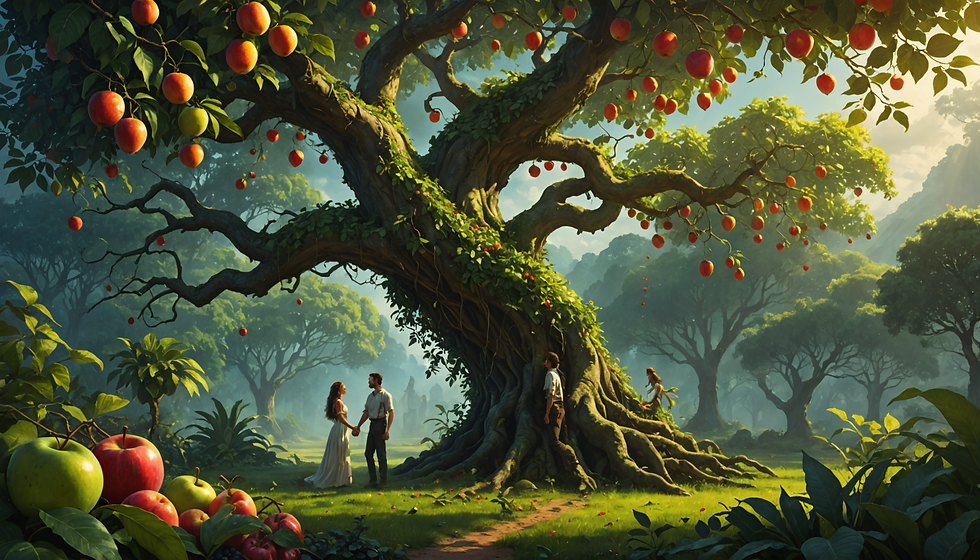Unraveling the Forbidden Fruit: An Enigmatic Tale of Adam and Eve's Expulsion from Paradise
- Amina Aliomar
- Jan 24
- 4 min read

The story of Adam and Eve is one of the most well-known narratives in religious texts, particularly in the Judeo-Christian tradition. It represents the eternal struggle of innocence, temptation, and consequence, illustrating the complexities of human desire and the nature of disobedience. This tale, centered around their encounter with the forbidden fruit, reveals themes of morality and accountability that resonate deeply with audiences today.
In this exploration, we will examine the key motifs of the story, analyze its implications, and consider how its lessons apply to contemporary discussions about ethics and human nature.
The Garden of Eden: A Paradise Lost

According to biblical tradition, Adam and Eve were the first humans created by God and were placed in the idyllic Garden of Eden—a realm of beauty, harmony, and abundance. The garden was not just a scenic landscape but also a sanctuary for a close relationship with the divine. It provided everything needed for sustenance and joy.
The Genesis account describes this paradise as free of suffering and want, where Adam and Eve enjoyed perfect harmony with themselves, each other, and their surroundings. Imagine a garden so filled with trees that one could choose from hundreds of varieties of fruits, all ripe and ready to eat.
The Tree of Knowledge of Good and Evil marked the central conflict in the narrative. It represented the divine authority and boundaries established for human desire. God's command against eating the fruit from this tree introduced the idea of moral choices, setting the stage for Adam and Eve's eventual decisions.
The Tempter's Intrusion
As the narrative unfolds, a serpent enters the scene, often viewed as a symbol of temptation. This deceptive creature approaches Eve with a seemingly innocent question: “Did God really say you must not eat from any tree in the garden?” This casual inquiry plants doubts about God's command.
This manipulation illustrates how easily divine authority can be challenged. Eve's conversation with the serpent captures her internal struggle between her desires and obedience. The serpent entices her with promises of knowledge and enlightenment, preying on her curiosity. According to some interpretations, the serpent’s challenge represents a formidable force many face today—how to navigate conflicting desires amid external pressures.
Eve ultimately chooses to eat the fruit. This pivotal act illustrates not just personal choice but also a universal desire for understanding, a theme relevant in every era. Adam's choice to follow suit further emphasizes our human experience with temptation and the intricacies of moral decision-making.
The Consequences of Choice
After consuming the forbidden fruit, Adam and Eve lost their initial state of innocence and gained awareness that altered their perception of themselves and their surroundings. For example, they suddenly felt vulnerable and ashamed due to their nakedness, which showcased how knowledge could lead to confusion and guilt.
The act of disobedience represents a critical turning point. The confrontation with God that follows their choice results in their expulsion from Eden, forcing them into a world marked by toil and struggle— a stark contrast to their prior lives of ease.
The expulsion serves as a powerful metaphor, highlighting the clear divide between innocence and experience. It underscores the inevitable consequences of the choices we make—both in the context of Adam and Eve's tale and in today's society.
The Symbolism of the Forbidden Fruit
The forbidden fruit, often depicted as an apple, symbolizes temptation, desire, and the human tendency towards disobedience—fundamental aspects of our nature. This fruit is more than just something to eat; it represents the quest for knowledge and the risks that come with striving for it.
Furthermore, the story emphasizes the importance of boundaries. It teaches that to grow and prosper, individuals must respect limits. Disregarding these boundaries can lead to significant consequences, as shown in the lives of Adam and Eve.
As we examine our own lives, this fruit's allure serves as a reminder to consider personal limits and the moral implications of our choices. Every day, society grapples with complex ethical dilemmas, and this timeless story invites us to reflect on the commitment between curiosity and obedience, liberty and accountability.
Lessons from Adam and Eve's Story

The narrative of Adam and Eve transcends religious traditions, offering valuable lessons for modern life. Here are a few key takeaways:
The Complexity of Free Will
Adam and Eve’s decisions illustrate the intricacies of free will. While they had the autonomy to choose, their actions had profound consequences. This reflects the struggles many face today regarding personal autonomy and responsibility.
The Nature of Temptation
Temptation is a common experience. The story shows how outside influences can challenge our internal beliefs. Learning how to manage temptation is essential for individuals in any era.
Knowledge and Consequence
The pursuit of knowledge can enrich our lives and present risks. The story highlights the need for caution when making choices in pursuit of understanding, reminding us that not all knowledge leads to significant personal growth.
The Importance of Boundaries
Boundaries are vital for healthy living. The forbidden fruit teaches us about the necessity of limits in various aspects of life, promoting well-being and personal reflection.
The Enduring Legacy of Adam and Eve

The tale of Adam and Eve has continued through generations, serving as a foundation for cultural, philosophical, and religious discussions. Its themes resonate through literature, art, and ongoing debates about morality. For example, many contemporary adaptations of this story explore modern ethical dilemmas regarding consent, knowledge, and freedom.
This enduring relevance highlights how deeply these concepts are woven into the human experience. The story prompts introspection about our desires, moral obligations, and the ongoing balance between knowledge and obedience.
Through various retellings and reinterpretations, Adam and Eve's legacy encourages each new generation to confront the pivotal questions their choices raise.
Reflection on Human Experience
The narrative of Adam and Eve eating the forbidden fruit and their expulsion from Eden offers a rich discussion about the human experience. It urges us to consider dignity and disobedience, knowledge and consequence, as well as temptation and morality.

As we navigate our modern lives, the lessons embedded in this timeless tale invite us to think carefully about our choices. Each decision we make can shape our understanding of ourselves and the world around us. By acknowledging this, we can embrace our journeys and the outcomes that follow, fostering personal growth and wisdom.
In exploring the enigma of the forbidden fruit, we reclaim a narrative that resonates with our lives. The ongoing quest for understanding illuminates the timeless struggle between right and wrong, desire and responsibility.



Comments